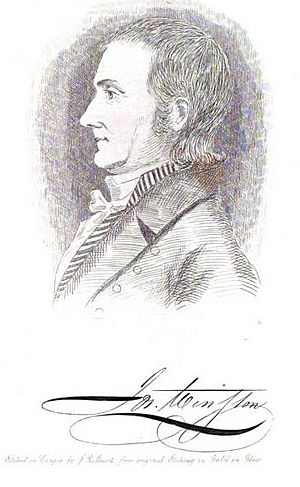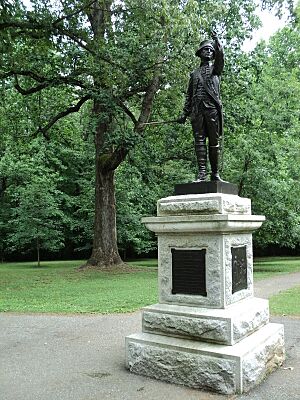Joseph Winston facts for kids
Quick facts for kids
Joseph Winston
|
|
|---|---|

Joseph Winston
|
|
| Member of the U.S. House of Representatives from North Carolina's 12th district |
|
| In office 1803–1807 |
|
| Preceded by | seat established |
| Succeeded by | Meshack Franklin |
| Member of the U.S. House of Representatives from North Carolina's 3rd district |
|
| In office 1793–1795 |
|
| Preceded by | John Ashe |
| Succeeded by | Jesse Franklin |
| Personal details | |
| Born | June 17, 1746 Louisa County, Virginia Colony, British America |
| Died | April 21, 1815 (aged 68) Germanton, North Carolina, U.S. |
| Military career | |
| Buried |
Guilford Courthouse National Military Park
|
| Allegiance | United States of America |
| Service/ |
North Carolina militia |
| Years of service | 1775-1783 |
| Rank | Lieutenant Colonel |
| Unit | Surry County Regiment |
Lieutenant Colonel Joseph Winston (born June 17, 1746 – died April 21, 1815) was an important American pioneer and politician. He was also a hero during the American Revolutionary War. Winston came from Surry County, North Carolina. He was even the first cousin of Patrick Henry, a famous statesman and governor of Virginia. Joseph Winston served in the United States House of Representatives and the North Carolina Senate. In 1766, he moved to what is now Stokes County, North Carolina.
Contents
Joseph Winston's Early Life
Joseph Winston was born on June 17, 1746. His birthplace was Louisa County in the Colony of Virginia. His family came to the American colonies from Yorkshire, England, in the 1600s. His father's name was Samuel Winston.
When he was young, Joseph fought with the Virginia militia. This was in 1763, against Native American groups near the border. Later, in the late 1760s, he moved to the Province of North Carolina. He settled near the Town Fork of the Dan River. This area was then part of Surry County. It later became Stokes County, North Carolina.
Joseph Winston's Public Service
Before the Revolutionary War, Joseph Winston was chosen as a delegate. He attended the North Carolina Provincial Congress in Hillsborough. He was also a member of the Surry County Committee of Safety. These committees helped organize local support for the American cause.
In 1775, he was again chosen as a delegate from Surry County. This time, he went to the North Carolina Provincial Congress in Halifax in April 1776. In 1778, he worked as the entry taker for Surry County. This role was like a register of deeds. He helped the Moravians with their Wachovia settlement.
Military Role in the Revolution
During the American Revolutionary War, Joseph Winston was a brave leader. He served as a 2nd major and then a 1st major. He was part of the Surry County Regiment of the North Carolina militia. He led a unit of riflemen, who were skilled shooters.
His unit fought in several important battles. These included the Battle of Moore's Creek Bridge, the Battle of Kings Mountain, and the Battle of Guilford Court House. His actions helped the American forces in these key moments.
Political Career After the War
After the war, Joseph Winston continued to serve the public. He represented North Carolina as a U.S. Congressman. This meant he helped make laws for the new United States. He also served in the North Carolina Senate from 1787 to 1789.
Joseph Winston's Legacy

Joseph Winston passed away on April 21, 1815. He is buried in a special place. This is the National Park at the site of the Battle of Guilford Court House. A monument was put up there in 1893. It honors Major Winston for leading the militia forces in that battle.
The town of Winston, North Carolina, was named after him. This town later became part of Winston-Salem, a larger city today.
 | George Robert Carruthers |
 | Patricia Bath |
 | Jan Ernst Matzeliger |
 | Alexander Miles |

